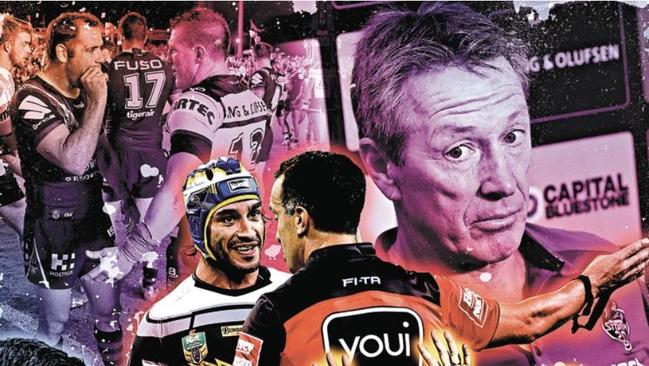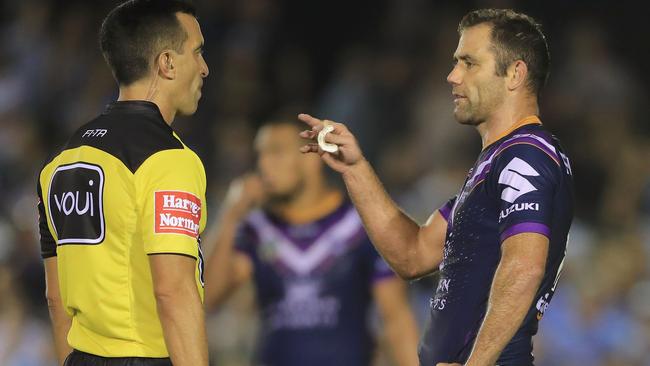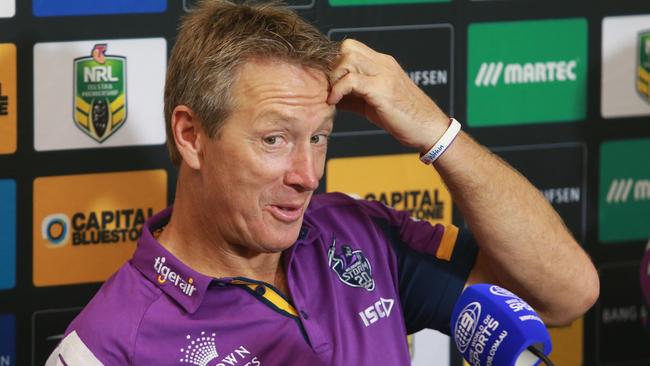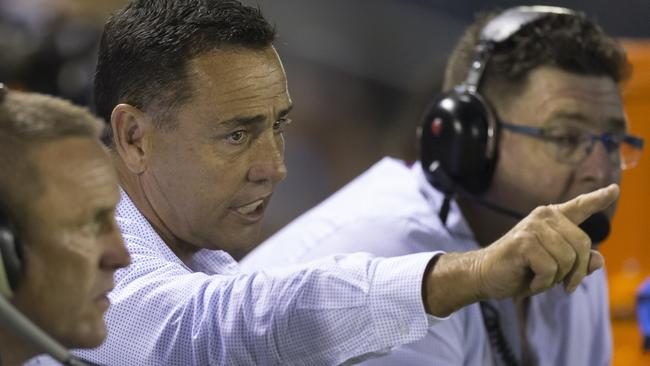NRL’s play-the-ball changes aren’t to punish mistakes — but to encourage a more open game
FANS want to ask why there were 33 penalties in the Cronulla-Melbourne game? The answer is simple. There was at least 33 infringements. And it wasn’t the referees’ fault, writes PAUL KENT.

Opinion
Don't miss out on the headlines from Opinion. Followed categories will be added to My News.
NRL teams call it The Cage. The little piece of real estate between sidelines that runs from their own tryline to the 10m line.
The Cage is the most important piece of real estate on the football field.
It is the only place on the field where mistakes have no forgiveness.
Break the defensive line there and they score.
Everywhere else on the field, teams have an opportunity to scramble and cover to prevent a try.
CRACKDOWN: NRL refusing to back down
BUZZ: NRL lurching from crisis to crisis
SLATER: Storm stuck in the past over ruck

So, given this importance, coaches have drilled their teams over the summer to slow the play-the-ball to a long, very long, six seconds for every tackle.
That is the pass mark coaches seek.
Six long, sleep-inducing seconds.
Teams would prefer to give a penalty away than fall short of the six seconds.
It sounds counter intuitive to concede penalties but there are legitimate reasons why.
A penalty in The Cage gives teams the chance to reset their defensive line if the attack is beginning to pull them out of shape. Much better to concede a penalty and reform than allow a three on two overlap.

The hidden truth is also that, while an extra six tackles sounds a burden, the penalties often come before the full six tackles are played out. So often only two or three or four extra tackles are actually added — but against a fully set defensive line.
They will stand offside on their tryline to better guard against ballrunners crashing through them. Another tactic.
This is the hidden game coaches have been playing against referees, exploiting their unwillingness to blow too many penalties in a game.
Coaches also know that a tipping point is reached where the pressure transfers from the defensive team holding their line to the attacking team getting repeat opportunities and getting frustrated at not scoring.
So soon, a pass gets pushed under such pressure and the strategy has paid off.

These tactical penalties are influencing the game without fans even knowing it. They have been for years.
“We’re in this state at the moment because the last three or four years there have been a lot of things let go,” Wayne Bennett said last weekend, in support of the crackdown that has many wailing.
“If the game blinks, well the coaches will be back in control but if the game stays strong, well we’re going to have to make sure our players are adhering to the rules.”
As they continue, they choke the game.

Melbourne captain Cameron Smith complained Friday night about a penalty against Ryan Hoffman standing offside where, he reasoned, it had no bearing on what happened at the ruck.
Canterbury favoured standing offside at the beginning of the games even if it meant conceding two or three penalties early.
Coach Des Hasler knew referees would quickly get spooked with the rising penalty count and put their whistle in their pocket, effectively allowing the team to stand offside for the rest of the game.
Another tactic sees teams deliberately stand offside on one side of the ruck knowing the clever dummy-half will look up, see less space, and so go the opposite side where there is more space to play.

The referees had no clue they were being played. They simply figured given the ball went away from where the offside defenders were there was no point penalising them since they played no part in the play.
But the defence was subversively dictating to the attack without the referees and fans even realising.
All because the referees would not blow the penalty to, as we prefer, “let the game flow”.
Few even realised we were being duped.
Former Souths coach Michael Maguire is now advising the referees and has woken them to the grey area coaches operate in.
Maguire has urged the referees to continue the blitz and not relax.
Cronulla backrower Luke Lewis told Triple M on Sunday the Sharks are already looking to change their behaviour based on the refereeing blitz.
The blitz is not a bad thing, despite complaints of inconsistency.
Blitzes are not launched to catch every offender.
When NSW Police launch a random breath testing blitz they don’t do it to catch every person who has a dozen schooners and picks up the car keys. There’s too many backroads for that.
They do it to put everyone on alert and change behaviour for the greater good.
Same with the current blitz on penalties.

Not every offence is going to be caught but slowly the players are being coached to changed their behaviour. Already the play-the-ball has improved considerably.
Now the referees are looking hard at penalties in The Cage.
They do so while being several marked for a supposed lack of consistency. They are not alone.
Where was Manly’s consistency, beating Parramatta 54-0 one week and losing to Souths 34-6 the next?
Or the Gold Coast’s consistency, losing to St George Illawarra 54-8 a fortnight ago and then beating Brisbane 26-14 on Sunday?
The game has been bent out of shape in recent years by coaches exploiting the conversation for a free-flowing match brought about by low penalty counts.
So they coach offside and the wrestle to slow down the play-the-ball and other tactics which the fans hate. We went this way with the scrum many years ago and now realise what we have lost, when it is too late.
Fans want to ask why there were 33 penalties in the Cronulla-Melbourne game?
The answer is simple. There was at least 33 infringements. It is up to the players to change that, not the referees.



